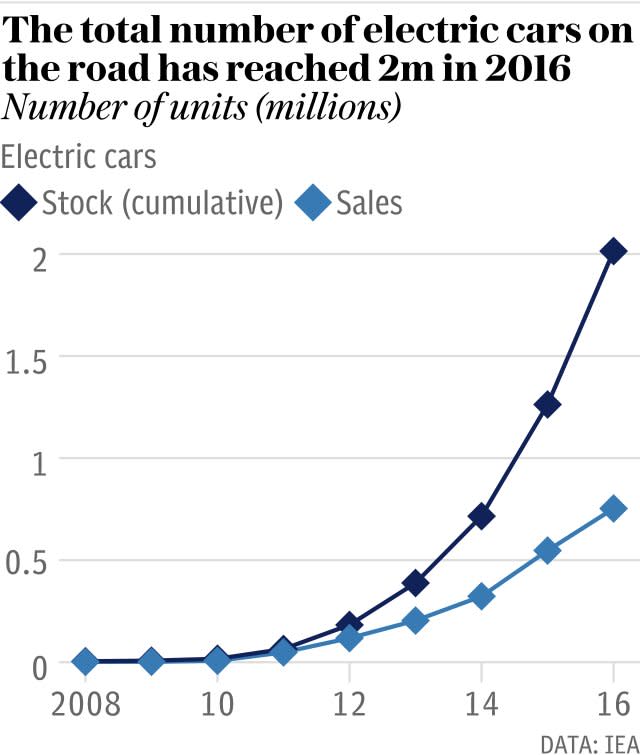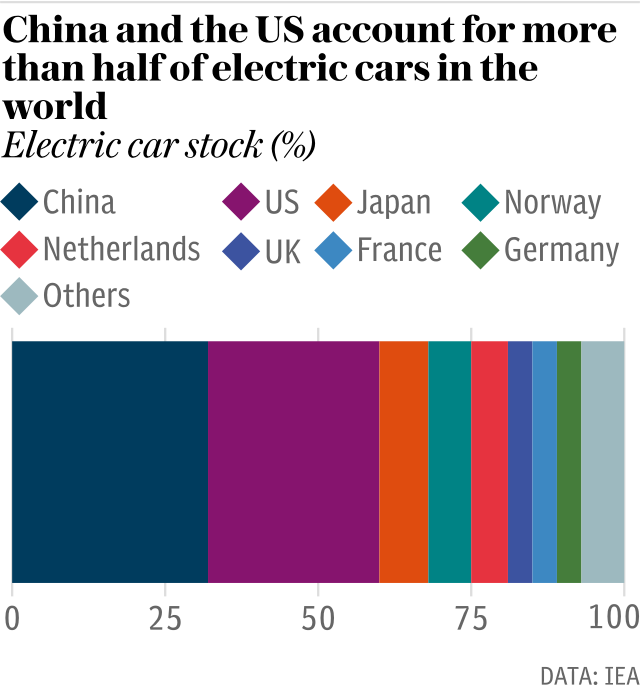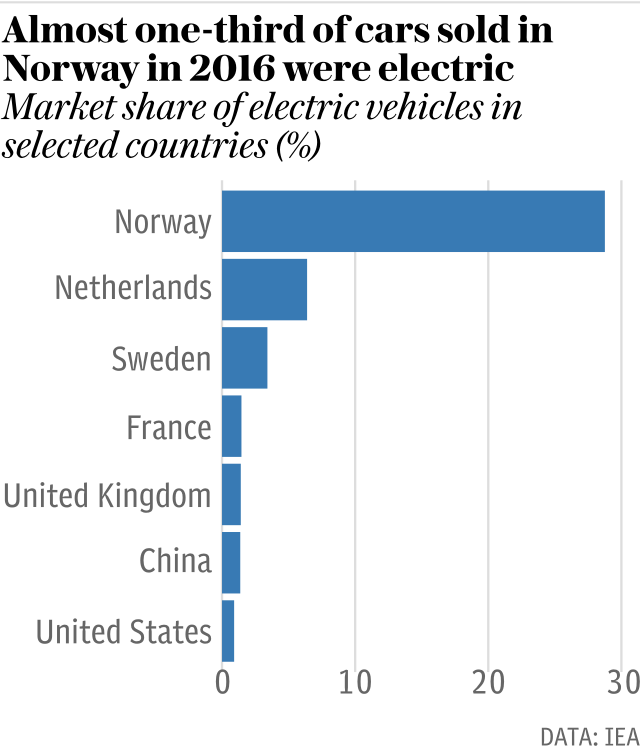The long and winding road of electric car adoption

The race is currently on in the electric car industry.
Volvo recently announced that it will become the first major car manufacturer to go all electric, with the Swedish company saying that every new car in its range will have an electric powertrain available from 2019.
Shortly after, Tesla, owned by billionaire Elon Musk, announced that its ‘budget’ Model 3 electric car went on sale earlier this month. This is the first Tesla car targeted for the mass market as it comes with a much more affordable price tag.
Now, the UK has followed France in announcing that new diesel and petrol cars will be banned by 2040.
Electric cars are forging the way to the future: car makers want to get their hands on the technology, as many governments look to cut down their carbon emissions.
However, the data show that there's a long way to go, with more traditional models still holding the biggest slice of the car market.
Electric car sales reached a record high in 2016
Sales of electric vehicles reached a new record in 2016, with 750,000 new electric vehicles being sold worldwide.
China, the biggest car market in the world, accounts for almost half of the sales figure in 2016. The country sold a total of 336,000 electric cars in the year.
The production level of electric cars has increased in line with the growing demand.
In 2016, there are more than two million electric cars on the roads globally. The number marked 1,500pc growth since 2005, when there were slightly more than 1,000 of them.

The latest Bloomberg New Energy Finance report estimates that by 2040, 54pc of new car sales and 33pc of the global car fleet will be electric.
China currently has the highest number of electric cars in the world. About 650,000 electric vehicles are on its roads, representing about a third of the world’s total. It has overtaken the US since 2014 to have the most number of electric vehicles.

Norway is currently leading the way in deploying electric cars into the market
While China boasts the highest number of car sales and production, Norway is currently the leader in deploying electric vehicles successfully in its car market.
Almost a third of cars sold in 2016 in the country are electric. In one of its cities, Bergen, electric cars have an almost 50pc market share of the year's sales.

Norway’s success boils to generous subsidies provided by the government. The country first introduced big incentives for electric cars in the 1990s. Electric car-driving Norwegians enjoy exemptions from purchasing taxes, no charges on toll roads, free parking and access to public bus lanes.
Many countries are lagging behind their adoption targets
The International Energy Agency (IEA) has set a global target, agreed in the Paris climate talks, to have 30pc of all new cars sales by electric by 2030.
Fourteen countries have since set ambitious targets to increase their electric car adoption as a means to reduce their carbon footprint. However, the statistics show that most still have a long way to go.
The UK Government has committed to banning the sale of all new diesel and petrol cars by 2040 in a bid to encourage people to switch to electric and hybrid vehicles. The Committee on Climate Change, an independent advisory body, has previously said that electric cars should make up at least 60pc of new cars and vans sold in the UK.
The electric car market share in the UK currently stands at slightly above 1pc.
France will outlaw the sale of all petrol and diesel vehicles by 2040, its new environment minister, Nicolas Hulot, has announced.

Germany aims to have one million electric cars on the road by 2020, but it is currently nowhere close to the target. Chancellor Angela Merkel said that Germany will likely miss the target as there are only around 70,000 electric cars in 2016.
The Department of Energy under the Obama administration previously set a target of having 1 million electric cars by 2015. However, as of 2016, they have only reached half the target and would not hit the number until 2020, according to US officials.
China, the world's biggest greenhouse gas emitter, has said it wants alternative fuel vehicles to account for at least one-fifth of its 35 million annual vehicle sales projectedby 2025.
India is mulling even more radical action, with plans to support electrifying all vehicles in the country by 2032. The IEA has called this plan "ambitious" as fulfilling this would mean India needs to sell 10 million electric cars in 2030.

What would it take for electric cars to become mainstream?
Various experts estimate that demand for electric cars will accelerate, with many revising their forecast figures upwards in 2016.
Both Exxon Mobil and BP raised their forecast to 100 million electric cars by 2040 and 2035 respectively from their previous figures. The International Energy Agency more than doubled its base-case electric car forecast for 2030. OPEC also revised its forecast to 266 million electric cars in 2040, almost sixfold the estimate of 46 million in the year prior.
Still, the success of electric car adoption hinges on its ability to become a commercially viable product and the availability of charging infrastructure.
Just like in Norway, electric cars are currently heavily subsidised in many countries. France is providing subsidy to help poorer households swap their existing cars for more environmentally alternative.
The British government is committing £900m to support the electric car industry.
"Government subsidies are paramount in the current uptake of electric vehicles," said Marine Gorner, the author of IEA's Global EV Outlook report.
However, relying on public finances may prove to be expensive in the long run and subsidies may no longer be possible or desirable as the sales volumes grow.
"Direct incentives, such as purchase rebates or VAT exemptions, bear the risk of becoming economically unsustainable for governments, as sales volumes increase," said Goerner.
"They will need to be progressively phased out, as the market develops."
Falling battery prices would therefore be crucial as battery packs still make a huge component of the vehicle's retail price. The current progress of battery innovation points that it is on track to meet the targets set for car manufacturers, according to IEA analysis.
Bloomberg forecasts that electric vehicles will become price competitive on an unsubsidised basis beginning in 2025. Real mass market adoption would only start then.
Moreover, most electric cars still have relatively low drive range. Hence, the availability of public charging infrastructure is crucial, and it is a problem that many countries have yet to solve.
Currently, electric cars still outnumber public charging stations by more than six to one. While the number of public chargers has grown significantly in the last five years, more are needed.

Should this problem persist, the growth of electric cars would hit a roadblock. According to Bloomberg analysis, many early adopters, such as China, the US and parts of Europe, will hit this 'infrastructure cap' in the mid-2030s and sales growth will slow significantly.

 Yahoo Finance
Yahoo Finance 